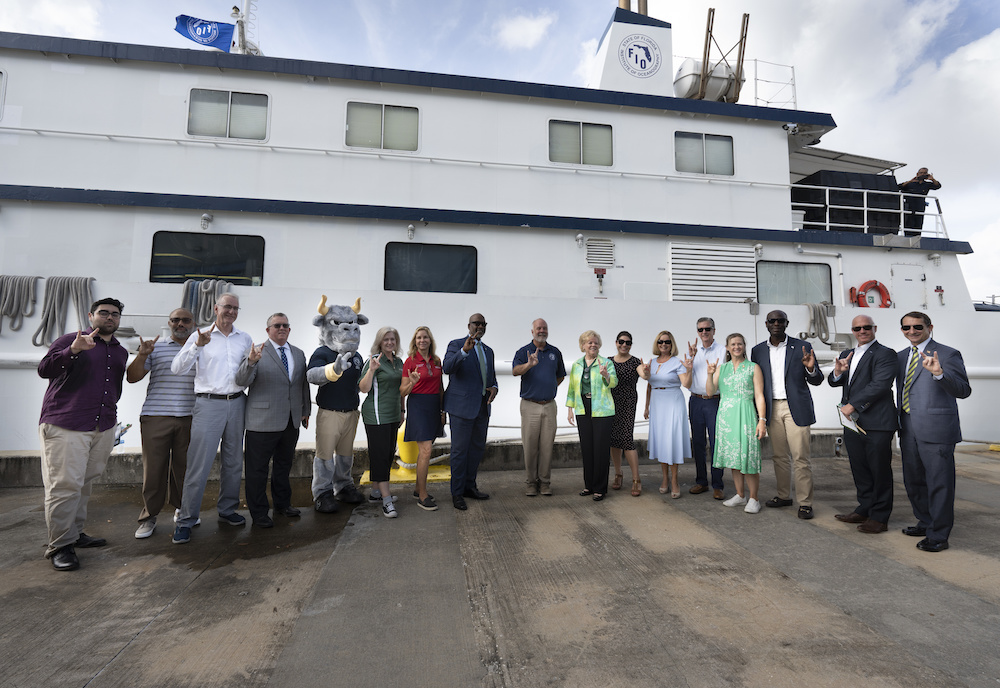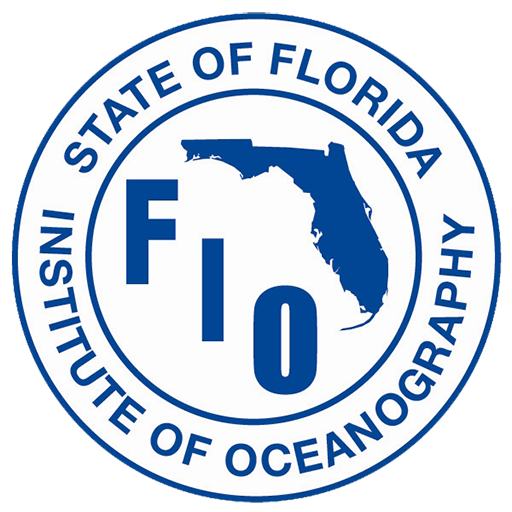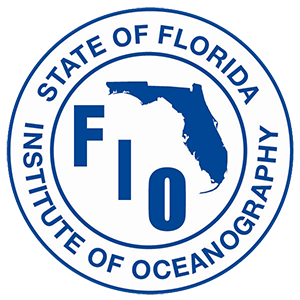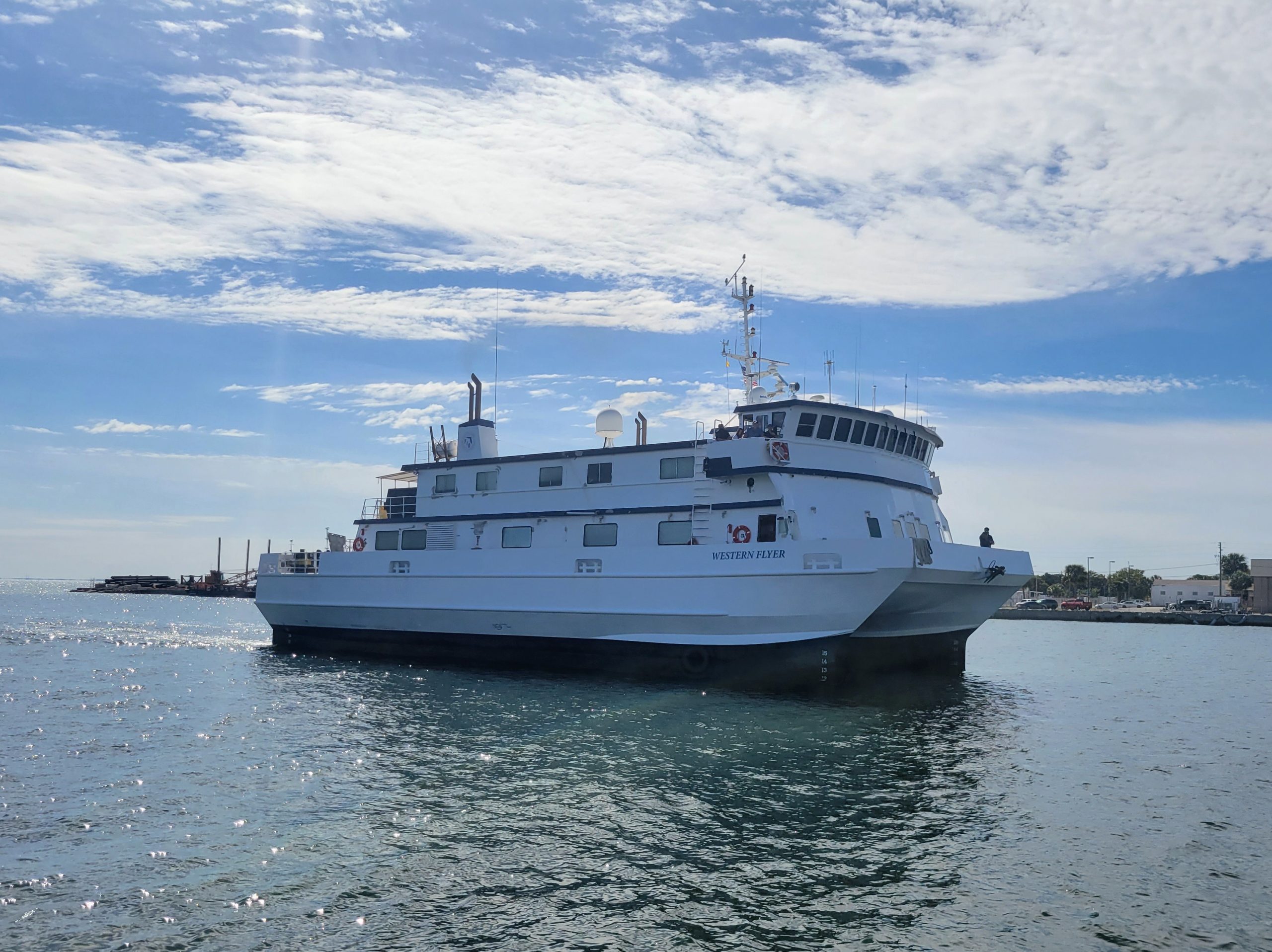
ST. PETERSBURG, Fla. (July 12, 2023) – After a 4,000-mile journey, a 117-foot twin-hulled ship granted to the University of South Florida (USF) is docked at its new home port in St. Petersburg, where it will be operated by the Florida Institute of Oceanography (FIO) to offer transformative opportunities for students to explore and advance the field of ocean science.
Called Research Vessel Western Flyer, the ship was granted to USF by the Monterey Bay Aquarium Research Institute and will be the most technologically advanced vessel in the FIO fleet. FIO is housed at USF and supports all institutions in the State University System.
While FIO’s other research vessels, Weatherbird II and Hogarth, operate primarily within Florida waters, the Western Flyer will embark on expeditions further afield – operating in waters off the southeastern U.S. and stretching into the northern Caribbean Sea. Capable of longer missions and with additional berths, the added capacities will allow more interdisciplinary expeditions including at-sea development opportunities for research, engineering, maritime trades and other STEM careers.
“The addition of this magnificent ship will strengthen the University of South Florida’s position as a global leader in sustainability, environmental and oceanographic sciences,” USF President Rhea Law said. “We are honored to accept this generous gift from the Monterey Bay Aquarium Research Institute. The Western Flyer will provide new real-world opportunities for students, help us fill the talent pipeline to meet workforce needs and expand our research capabilities.”
The vessel will feature a sophisticated remotely operated vehicle (ROV), designed to reveal the deepest, most mysterious parts of the Gulf of Mexico. Western Flyer is a distinctively wide and stable ship with a moon pool, an opening in the hull that allows scientists to deploy equipment such as the ROV.
The ROV will be used to livestream video, data and shipboard activities using remote science technologies, with the goal of allowing people on land and on board the vessel to cooperatively conduct research in real time.
“Our rapidly changing oceans require diverse perspectives, innovative technologies and approaches, and science-based decision-making,” FIO Director Monty Graham said. “We are excited to create the programming we need so that the Western Flyer, with all of its high-tech functionality, becomes not only a dynamic platform for the research itself but one through which we can advance the ocean science workforce.”
The FIO team is using the Western Flyer to create a new model for ocean science education that leverages the power of sustained mentoring and cohort-based programming, networked workforce development opportunities and remote science technologies. The yearlong program, called Peerside, is launching this summer with a select group of postsecondary students who will explore careers in ocean science, develop beneficial industry connections and conduct ship-to-shore research. Funding for this new at-sea ocean STEM program is supported by the Schmidt Ocean Institute and Schmidt Family Foundation.
“Schmidt Ocean Institute is delighted to be supporting this program that will work towards education and training for a more robust ocean science workforce. Early-career experiences at sea are important for inspiring and encouraging the next generation of scientists, maritime professionals and educators,” Executive Director Jyotika Virmani said.
The Western Flyer will complement the constellation of ocean science powerhouses, community engagement and education programs housed in St. Petersburg. The recently established Maritime and Defense Technology Hub hosted by the St. Petersburg Innovation District, for example, houses the Florida Flood Hub for Research and Innovation. The USF St. Petersburg campus is also developing a Center of Excellence in Environmental and Oceanographic Sciences. USF recently received a $24.3-million appropriation from the state of Florida to fund the first phase of planning and construction of the Environmental and Oceanographic Sciences Research and Teaching Facility, which will house the Center of Excellence.
“This initiative is well-timed,” said Tom Frazer, dean of the USF College of Marine Science, where FIO is housed on the St. Petersburg campus. “FIO’s new capabilities enhance our ability to develop a Center of Excellence that builds upon our college’s history of success and celebrates a cross-disciplinary approach to addressing the challenges of coastal resiliency and sustainability while advancing economic vitality in St. Petersburg.”
About the University of South Florida
The University of South Florida, a high-impact research university dedicated to student success and committed to community engagement, generates an annual economic impact of more than $6 billion. With campuses in Tampa, St. Petersburg and Sarasota-Manatee, USF serves approximately 50,000 students who represent nearly 150 different countries. For four consecutive years, U.S. News & World Report has ranked USF as one of the nation’s top 50 public universities, including USF’s highest ranking ever in 2023 (No. 42). In 2023, USF became the first public university in Florida in nearly 40 years to be invited to join the Association of American Universities, a prestigious group of the leading universities in the United States and Canada. Through hundreds of millions of dollars in research activity each year and as one of top universities in the world for securing new patents, USF is a leader in solving global problems and improving lives. USF is a member of the American Athletic Conference. Learn more at www.usf.edu.
About the Florida Institute of Oceanography
Established by the Florida Board of Governors and hosted by the University of South Florida, the Florida Institute of Oceanography (FIO) provides support and shares marine science resources between the state’s universities and private, non-profit marine research entities. FIO operates the R/V Weatherbird II, R/V Hogarth, the R/V Western Flyer and the Keys Marine Laboratory (KML) in Layton, Florida.


